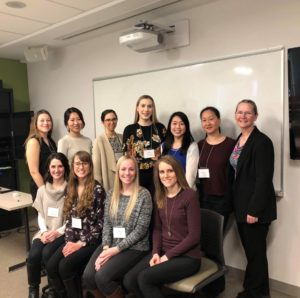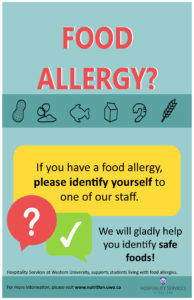An allergen risk management (ARM) plan is a first step in helping your institution put effective and consistent practices in place to ensure safe food options for students with food allergies. The plan should include an overview of your food allergy policies and procedures for managing risks at the various foodservice outlets on campus. Detailed ARM plan information is included in Food Allergy Canada’s “Managing Food Allergies and Anaphylaxis” guide for post-secondary institutions.
Graduate students in Brescia University College’s Master of Science in Foods and Nutrition program were tasked with creating an ARM plan for their Community Nutrition and Program Planning graduate course. Brescia is affiliated with Western University and, for this key project, a student team first had to conduct a situational assessment of Western’s Hospitality Services residence operations, campus eateries, and Great Hall Catering. Based on this assessment, the students then created an ARM program plan.

Back row (L to R): Christine Tsilas, Lucy Zhang, Maggie Assaff, Kristen Simonds, Jacqueline Siu, Marilyn Mori, Dr. June Matthews
Front row (L to R): Jennifer Beverley, Kimberly Charbonneau, Erica Bennett, Karen Hutchinson
Community Nutrition and Program Planning is taught by Dr. June Matthews, RD, P.H.Ec. and Associate Professor, who noted, “This course provides hands-on, experiential learning and gives students an excellent opportunity to apply their knowledge to real-life situations.” Dr. Matthews credits Anne Zok, Western’s Nutrition Manager and a stakeholder involved with the development and review of Food Allergy Canada’s post-secondary guide, with suggesting the project focus on food allergen management. The project had two phases (noted below) and represented a major part of a student’s final mark for the course.
Phase 1 included a situational assessment, a preliminary program plan, and an oral presentation. The graduate students interviewed many stakeholders, including Western Hospitality Services staff, unit chefs, front-of-house staff, and emergency responders. They also surveyed undergraduate students with and without food allergies and conducted a literature review. The students used Public Health Ontario’s Online Health Program Planner to create their preliminary program plan which they presented to Dr. Matthews and key stakeholders from Hospitality Services. The feedback they received was incorporated into their course submission for phase 1, and taken into consideration as they began work on Phase 2.
Phase 2 included a final program plan, a logic model, and an oral presentation. For this phase, students assessed the risks and benefits of their plan and identified priority action areas for implementation. The final program plan included detailed plans, rationales, deadlines, key contacts, and outputs, along with a comprehensive workplan, and was presented to a larger group. Attendees included Dr. Matthews, key stakeholders from Housing and Ancillary Services (including Hospitality Services), and several Student Emergency Response Team (SERT) members. Feedback from this presentation was integrated into their final submission for Phase 2.

Graduate student Erica Bennett, part of the 10-member team of students in the course, explained that they learned a broad range of information about food allergies. Through this project, they also had the benefit of hearing the perspectives of both students and staff. The team found it extremely helpful to present their plan to Hospitality Services and receive constructive feedback on what was feasible in the work environment. Erica commented, “It was really rewarding that all elements of our plan were considered for implementation.”
The program plan has a two-year timeline and some elements, such as posters and updates to menu item cards, signage, digital menu boards, and table tent cards, have already been implemented at Western. According to Anne Zok, “It has been great working with the Nutrition students at Brescia. They always have such innovative ideas and their passion comes through in projects like this.”
Has our “Managing Food Allergies and Anaphylaxis” guide inspired change on your campus? Share your story with us at info@foodallergycanada.ca
Tags: post-secondary